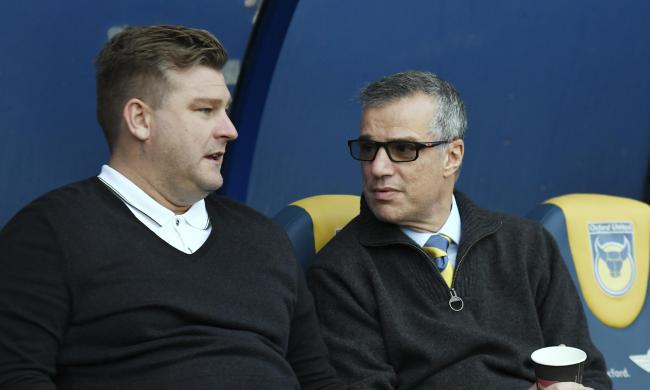Gary Bloom is Oxford United FC’s in-house psychotherapist. He tells Men’s Fitness why the sport is in need of a mental health revolution.
A record number of footballers are seeking mental health support, according to the Professional Footballs’ Association. In 2016, 160 professionals accessed the therapy on offer from the PFA, but this almost trebled to 438 professionals in 2018, with the PFA’s director of player welfare Michael Bennett predicting that this figure was set to “double or treble” yet again for 2019.
The reality is that with the rise of social media, footballers have never been under such intense scrutiny, and this has become a heavy burden for some to carry. Yet any footballer seeking help from the PFA currently has to wait three to four weeks to be seen by a counsellor, and there’s a big question mark around whether this treatment goes deep enough.

Photo: @Bloomers57
“Four weeks isn’t going to help anybody,” says psychotherapist Gary Bloom. “These players can’t wait around too long for help, as the pressure is so intense, and even when they get it, it’s not always easy to access. It doesn’t matter how much money they have in their bank accounts; we need to remember that footballers are human beings with weaknesses too.”
He adds: “If a footballer gets injured physically, then a club is willing to spend an infinite amount of money getting them fit and treatment starts almost instantly, but if they’re suffering from depression then there’re barely any resources to help and they are just expected to get on with it.
“A club will spend millions on dietary supplements and heart monitors, but nothing on mental health, and it’s such a big contradiction. It’s honestly a surprise there hasn’t been more high-profile suicides.”
‘Toxic Culture’
The in-house psychotherapist at Oxford United, Bloom works with the League One club’s manager Karl Robinson to provide weekly psychological care for his players. Since his appointment nearly two years ago, he says he’s treated individuals for anxiety, loss of form, injury, an inability to get into the first team, and even to help with the transition to a new club.
But in-house psychotherapy roles like his remain rare in the English game, and Bloom believes a toxic culture of football clubs being afraid to show any kind of weakness, particularly of the mental kind, is potentially putting players at risk. He even claims football is a “million miles away” from sports like cricket and rugby, where players are encouraged to talk openly to staff about their mental health and psychological worries.
Bloom started his career in football as a commentator, working with Sky, ITV and Channel 4’s Football Italia Show, but he eventually got tired of the clichés that came up while covering the sport. Naturally inquisitive, Bloom wondered if there were was more that star players weren’t telling him.
“I worked as a commentator for nearly 30 years, but the post-match interviews just got more and more dull for me. I thought to myself, What are they really thinking!? What must it feel like to miss the penalty that knocks England out of a World Cup?
“The nature of my work as a freelance commentator meant I had time to train as a psychotherapist, and I was driven by helping these guys out, as it was obvious they had very little support.”
This led to a role at mental health clinic Cognacity, which had clients including professional cricketers, Premier League footballers and also managers, and Bloom eventually set up his own private consultancy. He says he became shocked at the depth and scale of unhappiness of his clients and just how poorly this was being managed by their respective clubs.

Bloom (right) talks to Oxford manager Karl Robinson | Photo: David Fleming
Positive Impact
Bloom’s successful, and ongoing, On The Sporting Couch show on TalkSport radio has seen him interview high-profile sport figures like Sam Allardyce, Lawrence Dallaglio and Rebecca Adlington for frank discussions about their struggles with mental health. However, you sense it’s the role with Oxford United where Bloom can really see himself making the biggest difference.
“We had this player who couldn’t near the first team last season and had all sorts of personal issues,” he says. He told me that he felt like other people avoided him because he always seemed angry, so I worked with him to change his approach and have a more positive outlook and sense of worth.
“Three weeks later and he was in the first team. Within six weeks, he was scoring goals for fun. This is the kind of impact having an in-house mental health role can have.”
Need for More
Last year, the media reported on former Manchester United trialist Joel Darlington, 20, who was a victim of suicide having grown depressed after suffering persistent injuries and being forced to give up his career. Looking forward, Bloom says one of the biggest changes he’d like to see in football is more aftercare for players who leave clubs, particularly youth players like the late Darlington.
The brain doesn’t stop developing until you’re 24 as a woman or 26 as a man, according to Bloom, and he says most people don’t realise athletes are making huge decisions in front of thousands of people even though the wiring of their brain isn’t fully matured.
“That’s why you see young players do daft things! We need to be more understanding and let these kids make mistakes. The biggest clubs might have 200 young players coming through, of which one or two will be picked for the youth academy.
“What is in place for the other 190 plus players who have been dreaming of this for a decade or so? Football clubs have responsibilities for the academy players coming through. The amount of young players stuffed into the academies has grown exponentially over the last five to ten years, and they need more care.”
He goes one further, suggesting: “I think aftercare should be on offer for 18 months after a player is released. The idea that you can just drop a player who has dedicated ten years of their life to an academy or club, and not help them adjust to this new reality or maybe their dreams coming to an end is so cruel.”

Matty Taylor celebrates Oxford’s first goal in their match against AFC Wimbledon on 18 February | Photo: Getty
Time to Talk
Bloom is currently writing on a book about sport psychology for Penguin and says he hopes to grow awareness of mental health in football by holding regularly conferences for England’s biggest clubs to attend and learn about implementing new approaches.
Long gone are the days where footballers could scream at players to get results, according to Bloom, and he hopes that more clubs will hire someone in-house to talk to the players if they’re feeling depressed.
“You can’t just shout at young players and expect them to take it on anymore, because it doesn’t mean anything to them,” he says. “The best approach is to sit them down and really listen to them. It shouldn’t have to take a suicide for a club to improve their approach to mental health.
“The quicker they wake up, the stronger the game will be.”
Words: Thomas Hobbs










